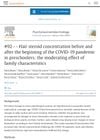 17 citations,
October 2012 in “Dermatologic clinics”
17 citations,
October 2012 in “Dermatologic clinics” Treating excessive hair in women requires a holistic approach, including medical, aesthetic, and emotional support.
 11 citations,
February 2008 in “British journal of nursing”
11 citations,
February 2008 in “British journal of nursing” Idiopathic hirsutism causes excessive hair growth in women, can be treated with medication and hair removal, but cannot be fully reversed.
 4 citations,
May 1989 in “Journal of the Royal Society of Medicine”
4 citations,
May 1989 in “Journal of the Royal Society of Medicine” Crohn's disease can cause hair loss before other symptoms appear.
 157 citations,
April 1994 in “Clinical endocrinology”
157 citations,
April 1994 in “Clinical endocrinology” Androgens can cause hair growth in some areas and hair loss on the scalp.
 147 citations,
April 1994 in “Drug Safety”
147 citations,
April 1994 in “Drug Safety” Some drugs can cause hair loss or increase hair growth, but these effects are usually reversible when the drug is stopped.
 108 citations,
July 2004 in “American Journal of Pathology”
108 citations,
July 2004 in “American Journal of Pathology” Stress increases a factor in mice that leads to hair loss, and blocking this factor may prevent it.
 44 citations,
January 2013 in “International Journal of Trichology”
44 citations,
January 2013 in “International Journal of Trichology” Finasteride 5 mg/day effectively treats hair loss in postmenopausal women without hyper-androgenism.
 25 citations,
May 2021 in “Journal of exposure science & environmental epidemiology/Journal of exposure science and environmental epidemiology”
25 citations,
May 2021 in “Journal of exposure science & environmental epidemiology/Journal of exposure science and environmental epidemiology” Common Black hair care products may affect hormone levels and potentially impact health, especially in reproductive and metabolic areas.
 20 citations,
July 2009 in “Journal of Pediatric and Adolescent Gynecology”
20 citations,
July 2009 in “Journal of Pediatric and Adolescent Gynecology” Quick treatment of hair disorders in teenage girls is important because of the emotional effects.
 11 citations,
September 1997 in “Archives of Dermatology”
11 citations,
September 1997 in “Archives of Dermatology” Reduced androgens linked to kinky hair disorder and hair loss; 5a-reductase inhibitors may help.
 4 citations,
August 2019 in “General and Comparative Endocrinology”
4 citations,
August 2019 in “General and Comparative Endocrinology” Male yak hair growth is influenced by DHT synthesis, which is promoted by 5α-red1 and AR during growth phases, while E2 may inhibit growth through ERα.
 4 citations,
January 2010 in “Acta dermato-venereologica”
4 citations,
January 2010 in “Acta dermato-venereologica” Low androgen levels can still cause female pattern hair loss.
 1 citations,
May 2017 in “InTech eBooks”
1 citations,
May 2017 in “InTech eBooks” Some natural remedies may help with hair regrowth, but more research is needed to confirm their effectiveness and safety.
 19 citations,
August 2010 in “Journal der Deutschen Dermatologischen Gesellschaft”
19 citations,
August 2010 in “Journal der Deutschen Dermatologischen Gesellschaft” Certain plant extracts can effectively treat skin conditions like athlete's foot, chronic vein problems, sun damage, skin growths, vitiligo, and hair loss, and may also improve skin appearance.
 February 2024 in “Psychoneuroendocrinology”
February 2024 in “Psychoneuroendocrinology” The COVID-19 pandemic did not significantly change stress levels in preschoolers, but higher-income families' children showed higher stress.
405 citations,
January 2004 in “Journal of Investigative Dermatology” Hair follicle size and distribution vary significantly across different body sites.
 146 citations,
July 2003 in “Journal of the American Academy of Dermatology”
146 citations,
July 2003 in “Journal of the American Academy of Dermatology” Clobetasol propionate ointment can help some people with total hair loss regrow hair.
 48 citations,
January 2000 in “Hormone Research in Paediatrics”
48 citations,
January 2000 in “Hormone Research in Paediatrics” Cytokines and neuropeptides are key in controlling androgen levels, affecting skin and hair conditions.
43 citations,
October 2005 in “Molecular and cellular endocrinology” Hair melanocytes help the skin respond to stress and regulate hair pigmentation.
 20 citations,
March 1994 in “Clinical and Experimental Dermatology”
20 citations,
March 1994 in “Clinical and Experimental Dermatology” Too much topical minoxidil can cause excessive hair growth, but stopping treatment reverses it.
 19 citations,
January 2008 in “The veterinary clinics of North America. Exotic animal practice”
19 citations,
January 2008 in “The veterinary clinics of North America. Exotic animal practice” Adrenal gland disease is common in ferrets and causes hair loss and other symptoms.
18 citations,
November 1998 in “Comparative biochemistry and physiology. Part A, Molecular & integrative physiology” Changes in prolactin and DHEA levels are not required for the start of mink hair growth cycles.
14 citations,
December 2021 in “International journal of molecular sciences” Growth hormone levels affect hair growth and loss, with too much causing excess hair and too little leading to hair loss.
 12 citations,
April 2020 in “British Journal of Dermatology”
12 citations,
April 2020 in “British Journal of Dermatology” Caffeine may help reduce stress-induced hair loss.
 12 citations,
January 2009 in “Gynecological Endocrinology”
12 citations,
January 2009 in “Gynecological Endocrinology” A postmenopausal woman's hair loss and excess hair growth improved after surgery for ovarian hyperthecosis.
 5 citations,
November 2021 in “Skin appendage disorders”
5 citations,
November 2021 in “Skin appendage disorders” Hair loss can cause stress and mental health issues, so treatments should address both the physical and psychological aspects, involving a team of dermatologists, psychologists, and hair specialists.
 5 citations,
November 1999 in “Medical Hypotheses”
5 citations,
November 1999 in “Medical Hypotheses” Minoxidil, a common hair loss treatment, might work by counteracting a hormone that reduces hair growth and promotes hair loss.
 4 citations,
September 2015 in “Case Reports”
4 citations,
September 2015 in “Case Reports” A man fainted and felt unwell after using a strong hair growth product, but got better when he stopped using it.
 3 citations,
January 2017 in “Yonsei Medical Journal”
3 citations,
January 2017 in “Yonsei Medical Journal” Blocking 11β-HSD1 can lessen the harmful effects of glucocorticoids on hair growth cells.
2 citations,
February 2024 in “Toxins” Bee venom can help stem cells promote hair growth.

























